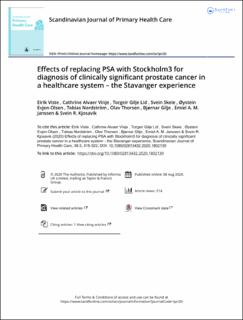Effects of replacing PSA with Stockholm3 for diagnosis of clinically significant prostate cance in a health care system – the Stavanger Experience
Viste, Eirik; Vinje, Cathrine Alvær; Lid, Torgeir Gilje; Skeie, Svein; Evjen-Olsen, Øystein; Nordström, Tobias; Thorsen, Olav; Gilje, Bjørnar; Janssen, Emiel; Kjosavik, Svein Reidar
Peer reviewed, Journal article
Published version
Permanent lenke
https://hdl.handle.net/11250/2736909Utgivelsesdato
2020-08Metadata
Vis full innførselSamlinger
Originalversjon
Viste, E., Vinje, C.A., Lid, T.G. et al. (2020) Effects of replacing PSA with Stockholm3 for diagnosis of clinically significant prostate cancer in a healthcare system – the Stavanger experience. Scandinavian Journal of Primary Health Care, 38(3), 315-322 10.1080/02813432.2020.1802139Sammendrag
Objective
To describe early experience of replacing PSA with Stockholm3 for detection of prostate cancer in primary care.
Design and methods
Longitudinal observations, comparing outcome measures before and after the implementation of Stockholm3.
Setting
Stavanger region in Norway with about 370,000 inhabitants, 304 general practitioners (GPs) in 97 primary care clinics, and one hospital.
Intervention
GPs were instructed to use Stockholm3 instead of PSA as standard procedure for diagnosis of prostate cancer.
Main outcome measures
Proportion of GP clinics that had ordered a Stockholm3 test. Number of men referred to needle biopsy. Distribution of clinically significant prostate cancer (csPC) (Gleason Score ≥7) and clinically non-significant prostate cancer (cnsPC) (Gleason Score 6), in needle biopsies. Estimation of direct healthcare costs.
Results
Stockholm3 was rapidly implemented as 91% (88/97) of the clinics started to use the test within 14 weeks. After including 4784 tested men, the percentage who would have been referred for prostate needle biopsy was 29.0% (1387/4784) if based on PSA level ≥3ng/ml, and 20.8% (995/4784) if based on Stockholm3 Risk Score (p < 0.000001). The proportion of positive biopsies with csPC increased from 42% (98/233) before to 65% (185/285) after the implementation. Correspondingly, the proportion of cnsPC decreased from 58% (135/233) before to 35% (100/285) after the implementation (p < 0.0017). Direct healthcare costs were estimated to be reduced by 23–28% per tested man.
Conclusion
Replacing PSA with Stockholm3 for early detection of prostate cancer in primary care is feasible. Implementation of Stockholm3 resulted in reduced number of referrals for needle-biopsy and a higher proportion of clinically significant prostate cancer findings in performed biopsies. Direct healthcare costs decreased.
KEY POINTS
A change from PSA to Stockholm3 for the diagnosis of prostate cancer in primary care in the Stavanger region in Norway is described and assessed.
•Implementation of a new blood-based test for prostate cancer detection in primary care was feasible. A majority of GP clinics started to use the test within three months.
•Implementation of the Stockholm3 test was followed by:
–a 28% reduction in number of men referred for urological prostate cancer work-up
–an increase in the proportion of clinically significant cancer in performed prostate biopsies from 42 to 65%
–an estimated reduction in direct health care costs between 23 and 28%.

